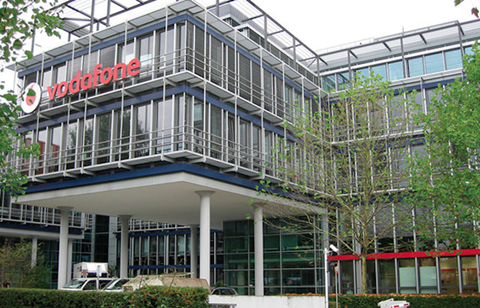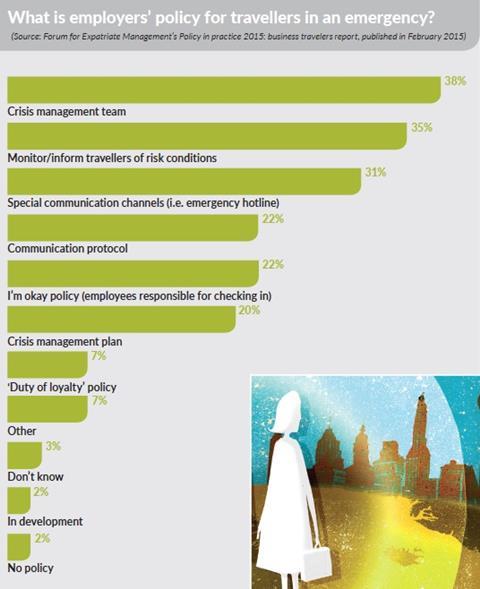
Need to know:
- Travel insurance and international private medical insurance may offer support in the event of a terrorist attack but some schemes may exclude terrorism.
- An employee assistance programme can be a valuable resource, especially in the aftermath of a crisis.
- Specialist security and crisis management advice may be offered by insurers but, if not, might be worth considering separately.
Increased terrorist activity towards the end of 2015 has heightened concern among global employers as to how they can support staff working or travelling overseas in the event of a crisis.
Although the likelihood of being caught up in terrorist activity is small, being prepared for a crisis is vital and, as November’s events in Paris have shown, even business travel to previously considered safe destinations should be under scrutiny.
Eugene Farrell, head of trauma support services at Axa PPP Healthcare, says: “There is increased threat in the world. Any city can be a target and any employees who are travelling face the potential threat of being involved directly or indirectly in some sort of terrorist incident.”
Long-term assignments
For employees on long-term assignments overseas,international private medical insurance (IPMI) should cover evacuation and repatriation. According to the Association of British Insurers (ABI), there are group private medical insurance schemes in the market that will cover terrorism incidents. However, policies vary, so it is important for employers to check terms and conditions and speak to their insurer about any concerns.
Global employee assistance programmes (EAPs) will have a 24/7 helpline that employees can call for confidential advice at any time: pre-travel, during the event or in the aftermath. But EAPs can also provide help and support beyond a telephone call. “Most EAPs will provide trauma support services that can be activated. [One] would expect them to provide some consultancy to begin with and give a steer on what the [employer] should be doing to manage psychological impact,” explains Farrell. “Then [it] moves into the supportive phase, doing something onsite or one-to-ones, depending on the nature of the incident.”
Supporting business travellers
For business travellers, the main applicable benefits are travel insurance for short-term trips, IPMI for longer stays and global EAPs. Crisis management assistance services and employee-tracking software can also reassure staff that their employer is taking safety seriously. These benefits can also demonstrate duty of care under the Corporate Manslaughter Act, which can hold company directors liable for employees’ wellbeing.
David Sterling, director at insurance broker Crispin Speers and Partners, says: “One way [businesses] can mitigate their exposure is by buying travel insurance. All businesses should be doing something to ensure employees are covered when they are acting on their behalf.”
Although some travel insurance will have a terrorism exclusion, this would usually apply to disinclination to travel to an affected destination, but should usually cover medical emergencies, repatriation for treatment or transfer to the nearest suitable facility.
Peter Hayman, director at travel insurance firm PJ Hayman and Company, says: “Most schemes will provide an element of cover for medical expenses and might also include personal accident, but it wouldn’t provide cancellation cover or curtailment cover in the event of someone not wanting to travel or wanting to return. That is a standard travel insurance approach.”
Sterling adds: “It is in [an employer’s] interests to read their policy and speak to its provider. Most insurers would look after their customers should they get caught up in an incident.”
Crisis management
Other benefits employers may consider are crisis management and security services, such as International SOS and Red24, which are sometimes offered alongside, or as an add-on, to insurance products. These typically provide a 24/7 helpline, but can also help with executive protection, evacuation and repatriation.
Tim Willis, security director for Northern Europe at International SOS, says the security service took a high number of calls after the Paris attacks and Brussels security lockdown. “We spoke to someone in a hotel close to the Bataclan who was in a panic about what to do. The reality was that they were in a safe location and the best thing they could do was to stay in the hotel.
“Getting that rational advice helps individuals in distress take the right course of action. We had another client that wanted executive protection in Paris to provide security and reassurance.”
Other providers, such as Vismo, offer employee-tracking technology through an app downloaded to a smartphone, which sends their location to a secure website. Colin Dale, business development director at Vismo, explains: “In a crisis the employee can press a panic button on their phone, which will send an alert to the employer.
“Lots of our clients had staff in Paris and wanted to know where they were. From the platform, [employers] can send out mass text messaging to everybody in that area to check they are okay and give them advice on where to go.”
Although designed for travel, many employees are leaving the tracker on, even on home soil, says Dale. “There is going to be a terrorist attack in London, it is [a case of] when, not if, so people are rightly concerned about where their staff are.”
And with the current UK threat level for international terrorism set at severe, businesses would do well to think about UK-based employees too, not just those overseas.

Vodafone supports global employees via tracker app
Mobile communication provider Vodafone uses International SOS to help protect staff based overseas and travelling on business. The business uses the TravelTracker app and security and medical services, says John Bernard, senior security manager, personnel and asset protection at Vodafone.
“[We] can get 24/7 support in most languages,” he explains. “I don’t want our colleagues being bounced around when they need this support. If [they’re] using the service [they] are either looking for assurance, support or intelligence, so [they] don’t want to be passed from pillar to post.”
The service was vital during November's terrorist attacks in Paris. “We operate as a 24-hour business, so it was vital we knew very quickly that our people were safe, secure and they were aware of the situation,” says Bernard. “Using the TravelTracker tool we had the ability to get the data regarding travellers in and out of Paris very quickly, and this helped the team and I to focus our efforts in the right place. In situations [such as] this, which are becoming more frequent, every second counts.”
Bernard views these services as an important benefit. “[With employees] travelling anywhere [we] need to be able to support them should a situation occur, advise them before they go, and gather feedback on their return. Knowing where [our] people are and being able to react quickly when things do go wrong is vital in today’s world. I would be very surprised if any organisation didn’t think the same.”

Viewpoint: A crisis is not something employers can control, but they can be prepared
Being prepared for the unexpected will give an employer peace of mind, faster resolution, and highlight commitment to the safety and wellbeing of employees.
Employers should consider potential risks and review all insurance policies to ensure cover is adequate, as insurers often exclude things like war and acts of terrorism. Emergency travel insurance can cover repatriation of employees overseas, but check exclusions. Employers may also wish to review catastrophe limits on life policies. It is worth looking at employee assistance programmes (EAPs), because some offer specific trauma support.
Employers should have a plan for various scenarios. To ensure employees know how to respond it is important to run drills, not only for evacuation, but also for invacuation, such as to congregate in a safe zone if there is an explosion outside. In times of confusion, people need very clear expectations set. It is essential to create a crisis notification cascade process to ensure all employees are notified immediately.
When the worst happens, employers should consider how to support the physical and emotional wellbeing of staff during difficult times. Ensuring the health and safety of employees is the first priority.
Not all employees will respond in the same way to a crisis, and provision of face-to-face support and counselling can be essential.
When the dust has settled, it is best to get back to ‘business as usual’ as soon as possible, bearing in mind employees may still be shaken up for some time. An EAP can give employees ongoing support.
It is good to recognise contributions of individuals during the event, and to demonstrate what lessons have been learnt. In the end, the best way out of the mist is to focus on a more positive future.
Sally Hart is executive director of the International Benefits Network, a network of independent benefit consulting firms around the world.












